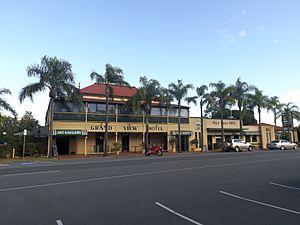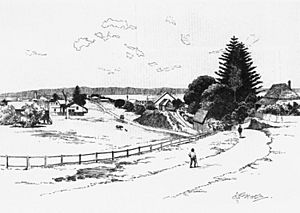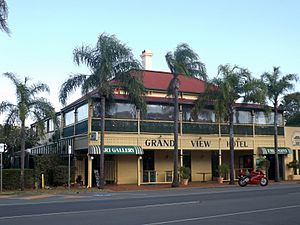Grand View Hotel facts for kids
Quick facts for kids Grand View Hotel |
|
|---|---|

Building in 2015
|
|
| Location | 49 North Street, Cleveland, City of Redland, Queensland, Australia |
| Design period | 1840s–1860s (mid-19th century) |
| Built | c. 1852 |
| Built for | Francis Edward Bigge |
| Official name: Grandview Hotel, Brighton Hotel, Cleveland House | |
| Type | state heritage (built) |
| Designated | 21 October 1992 |
| Reference no. | 600771 |
| Significant period | 1850s-? (fabric) c. 1852-ongoing (historical use as boarding house or hotel) |
| Significant components | out building/s, fireplace |
| Lua error in Module:Location_map at line 420: attempt to index field 'wikibase' (a nil value). | |
The Grand View Hotel is a very old hotel located at 49 North Street in Cleveland, Australia. It was built around 1852 and is known for its long history. This building has also been called the Brighton Hotel and Cleveland House over the years. It was officially added to the Queensland Heritage Register on 21 October 1992 because of its special importance.
Contents
Grand View Hotel: A Historic Queensland Landmark
The Hotel's Early Days
The main part of the Grand View Hotel was built in the early 1850s. It was owned by Francis Edward Bigge, a member of the New South Wales Parliament. He bought the land in August 1851.
In the 1840s and 1850s, people from places like Darling Downs and Ipswich wanted Cleveland Point to be the main port for the Moreton Bay area. Francis Bigge, who was a grazier (someone who raises livestock) from Mount Brisbane, was one of the main people pushing for this. He invested a lot of money in businesses and homes in Cleveland during the early 1850s.
From "Bigge's Folly" to Brighton Hotel
The very first part of the hotel was built by 1852. It was meant to show how much Bigge believed in Cleveland's future. However, it stayed empty for several years. People sometimes called it "Bigge's Folly" (meaning Bigge's silly idea). Its official name was Cleveland House.
This early building had two sitting rooms and five bedrooms. It also had a kitchen and rooms for servants, connected by a covered walkway. A wide, 3-meter (about 10 feet) verandah went all around the main building.
From 1855 to 1860, a man named John Vincent Cassim leased Cleveland House. He ran it as a boarding house, which is like a guesthouse. By the middle of 1860, stables, a coach-house, a store, and a bar were added.
In 1862, a publican (someone who runs a pub) named William Rae leased the building. He renamed it the Brighton Hotel. It even had its own bathing-house, a jetty for boats, and a 10-tonne pleasure boat.
Growing and Changing Over Time
Before St Paul's Anglican Church was built nearby in 1874, the hotel was also used for Anglican church services.
In 1878, Andrew and Mary Goodall, who were also publicans, bought the property. The hotel seems to have been made bigger towards the southeast. Major changes, which gave the building its current two-storey look, likely happened in the late 1880s or mid-1890s. This was when the Cleveland railway line opened, making it easier for people to visit.
The hotel became known as the Grand View Hotel around 1910. It stayed in the Goodall-Singh family until 1936. More buildings have been added since the 1940s. Inside the public bar, there are five small paintings on the wall. These paintings show local historical events and were probably painted in the 1950s. The hotel was also updated in 1982 and again in 1992.
Today, the Grand View Hotel is still operating as a hotel. It is one of the oldest hotels in Queensland that has been used continuously for so long.
What the Grand View Hotel Looks Like
The Grand View Hotel is a group of buildings. The main part is a two-storey brick building that stands right up to the footpath on North Street. It is located on a small hill leading to Cleveland Point and has views of the water on three sides.
Outside the Hotel
The two-storey section has open verandahs on both levels facing the street. These verandahs also wrap around the northeast side of the building. The curved roof of the verandah is slightly lower than the main roof, which has a hipped shape. One chimney rises above the roof.
The verandahs have cast iron balustrades (railings), brackets, and valances (decorative borders). These look similar to an older design but are not exactly the same. Below the railing, there is a patterned wooden frieze (a decorative band). The verandahs at the back and southwest side are now enclosed with flat sheets.
Inside the Hotel
The main inside walls are made of brick with a smooth finish. A wide hallway runs through the middle of each floor. The upper floor is mostly original and has a fancy fireplace. This floor is now used as private living quarters.
French doors with fanlights (windows above the door) open onto the verandahs. A large staircase with painted wooden railings is lit by a skylight from above.
The lower floor has reception rooms and a kitchen. One large room has a fireplace made of marble and tiles. This room opens to the northeast through French doors, which have casement windows above them. These windows might be from the 1850s. The main entrance is on the northeast wall. It has clear and red glass side lights (windows next to the door) and an old stencilled glass fanlight. The main foyer (entrance area) used to be part of the verandah. You can still see some of the original brickwork there, without paint or plaster.
Next to the two-storey building, on the southwest side, is a smaller, single-storey building. It is made of chamferboard (wooden planks with angled edges). It has a hipped roof and a separate curved roof over a narrow verandah. This building opens onto the beer garden. Inside, part of its higher, wooden ceiling is still there.
Connected to these buildings is a group of rooms under shallow, sloping roofs, surrounded by parapets (low walls).
The public bar area has a series of small paintings on the wall. These paintings show different historical events from the local area.
Why the Grand View Hotel is Special
The Grand View Hotel was listed on the Queensland Heritage Register on 21 October 1992 for several important reasons:
- It shows how Queensland's history developed.
The Grand View Hotel, with its main part built in the early 1850s, helps us understand how early European settlements grew in Queensland. Its construction shows the different things that influenced that growth.
- It is a rare and special part of Queensland's history.
It has parts of one of the very first buildings in Cleveland. The Grand View Hotel is rare because it is one of the oldest hotels in Queensland that has been used continuously since it was built.
- It is beautiful and important to the community.
The building stands out and adds to the look of Cleveland Point. This is something that the people of Cleveland really value.
- It is connected to important people and events in Queensland's history.
The hotel has a special link to F.E. Bigge and his efforts to make Cleveland the main port for Moreton Bay. It also connects to the idea of Ipswich becoming the capital city.
 | Leon Lynch |
 | Milton P. Webster |
 | Ferdinand Smith |



